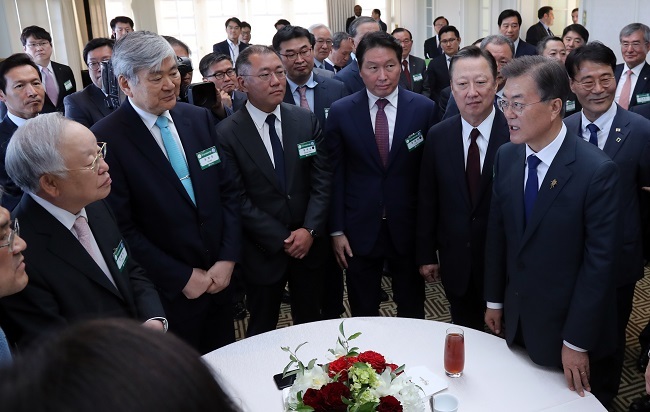WASHINGTON/SEOUL -- President Moon Jae-in on Wednesday said that peace on the Korean Peninsula will provide an opportunity for growth and investment in North Korea for both Korean and US companies.
Speaking at a forum with US and Korean business leaders organized by the two countries’ chambers of commerce, Moon also urged closer collaboration between South Korean and US businesses to facilitate the two nations becoming “strategic economic partners.”
At the event held in Washington DC, Moon said that the Korea-US alliance has grown from one focused on security to include economic issues, and has become stronger in the process. And that his administration is working to resolve security issues on the peninsula on the foundations of the Korea-US alliance.
 |
President Moon Jae-in (right) converses with business leaders at a meeting held at Hay Adams Hotel in Washington on Wednesday. From left are CJ Group Chairman Sohn Kyung-shik, Hanjin Group Chairman Cho Yang-ho, Hyundai Motor Group Vice Chairman Chung Eui-sun, SK Group Chairman Chey Tae-won and Korea Chamber of Commerce and Industry Chairman Park Yong-maan. (Yonhap) |
“The new government will do its best to resolve the North Korean nuclear issue from the foundations of the firm Korea-US alliance,” Moon said.
“In the process of realizing our government’s plans, you will be able to invest in South Korea without worry, and further more opportunities to invest in North Korea could be provided.”
The South Korean president also explained about his government’s economic policy direction, and called for bilateral economic cooperation to be taken to a new level.
“I hope the Korea-US economic cooperation to go beyond bilateral trade and investment, to become ‘strategic economic partners’ that pioneer the global market,” Moon said.
According to presidential spokesman Park Soo-hyun, the attending US business leaders showed high interest in South Korea’s plans for increasing renewable energy sources.
Regarding his administration’s economic policies, Moon said that the aim is to focus on the people, and in the process establish a fairer, and more transparent business environment.
“The government’s new economic policy is to seek a ‘people-centric’ economy. It is a change of concept that places the people, and households at the center of economic policies,” Moon said.
“The core is employment. If jobs are created, household income rises. The aim is to create positive feedback in which the increased income boosts domestic spending and tows economic growth, and economic growth in turn leads to job creation.”
Taking Moon’s visit to the US as momentum for strengthening bilateral business ties, the 52-member business delegation said later in the day that they would invest a combined $12.8 billion in the US over the next five years.
The Korean businesses will purchase $22.4 billion worth of US products, including aircraft, by 2021, they added.
The group includes South Korean tycoons from major conglomerates including Samsung, Hyundai Motor, LG and SK Group. The delegation also includes small- and medium-sized enterprises and startups.
By companies, Samsung Electronics plans to inject around $380 million to build a home appliance factory with $380 million in South Carolina, and an additional $150 million to expand the production capacity of its chipmaking plant in Austin.
LG Electronics also plans to build a $250 million factory capable of manufacturing 1 million washing machines a year in Tennessee, and also a $300 million new office in New Jersey. Both construction plans are to be completed by 2019.
South Korean telecom-to-energy conglomerate SK Group will invest 1.8 trillion won on energy development. SK Group Chairman Chey Tae-won, a member of the business delegation, attended a signing ceremony of a memorandum of understanding on strengthening the strategic partnership with US firms, GE and Continental Resource, on shale gas production in the US and also seeking global marketing opportunities for fuel sales. The agreement comes as part of SK’s investment plan in the US, and the group will seek potential investment opportunities worth 3-5 trillion won, it added.
Reiterating its earlier announcement, Hyundai Motor will pour $3.1 billion into the US on research and development projects on green and self-driving cars, as well as engines.
Doosan Group, through its US affiliate Doosan Bobcat and Fuel Cell America, will spend $770 million for plant expansion and the development of rechargeable batteries and energy storage systems.
CJ Group is eying the food and bio market and plans to expand its logistics network through merger and acquisition with $1.05 billion, while LS Group will invest $320 million in a list of plans including a $40 million autopart plant. GS Group Silicon Valley will spend $10 million on a housing plan, while Hanjin Group, parent company of Korea’s largest air carrier Korean Air, plans to spend $7 million on renovations for a cargo terminal in Los Angeles.
By Choi He-suk (
cheesuk@heraldcorp.com) and Cho Chung-un (christory@heraldcorp.com)





![[Exclusive] Hyundai Mobis eyes closer ties with BYD](http://res.heraldm.com/phpwas/restmb_idxmake.php?idx=644&simg=/content/image/2024/11/25/20241125050044_0.jpg)
![[Herald Review] 'Gangnam B-Side' combines social realism with masterful suspense, performance](http://res.heraldm.com/phpwas/restmb_idxmake.php?idx=644&simg=/content/image/2024/11/25/20241125050072_0.jpg)

